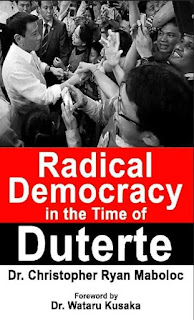Editors of Philippine Democracy Online

Menelito Mansueto is a permanent faculty at the Mindanao State University - Iligan Institute of Technology. He has taught at the University of Santo Tomas, Far Eastern University - Diliman, Bohol Island State University, and the Colegio de San Juan de Letran in Manila. He has a master's degree in philosophy from Holy Name University in Tagbilaran City. He is pursuing his doctorate in Global Justice and Sustainability at the American University of Sovereign Nations. He has published articles in indexed local and international journals. He has presented his research papers in the PHAVISMINDA Conferences, the Social Ethics Society (SES) Conferences, and the International Public Health Ambassador Conference (IPHA). He is a member of the Board of the Social Ethics Society. He has published a book chapter in Ethics in Contemporary Philippine Society. He is also a peer reviewer for various local and international journals. He is a co-author of the newly released book Radical Politics in t...

.jpeg)
